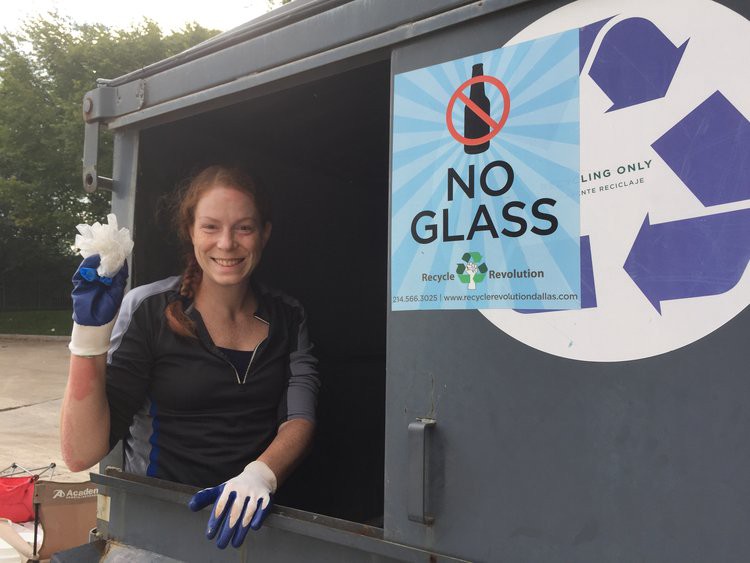Written by: Stacy Savage
In August 2018, the Dallas City Council voted to approve a recycling ordinance for all multi-family dwellings with 8 units or more. By January 1, 2020 all affected multi-family properties must provide access to recycling for staff and tenants and provide education training.
Through a Meadows Foundation grant, Texas Campaign for the Environment Fund (TCEF) contracted our company, Zero Waste Strategies, LLC (ZWS), to conduct 9 waste and recycling characterization studies within the Dallas city limits. The studies determined the current and potential recycling rates of different types of businesses, such as restaurants, hotels, multi-family complexes, and office buildings.
The findings of our waste studies were presented to the participating businesses and to the Dallas City Council to provide a cross-sectional view of business recycling rates or lack thereof. This reporting will help inform the Council’s decision-making process of potentially expanding the multi-family recycling ordinance to include all commercial properties. This vote is anticipated in mid-2019, but we also hope a vote to require food-permitted businesses to divert organic wastes from landfills will also be on the docket soon.
Recruitment
Waste audit recruitment had to happen on 2 fronts: Business participants to give us materials to sort and volunteers to help sort the materials.
The recruitment process to get businesses enrolled in our complimentary program was surprisingly challenging. Even though we had concise, but impactful scripts for outreach, as always, getting to the correct contact was the biggest obstacle. Because the services of ZWS were already funded through a non-profit organization, telling prospective business participants that our services were free seemed to raise major red flags.
We would go through gatekeeper after gatekeeper after gatekeeper to finally get to the correct person, only to hear an “out of office” message. Leaving a voicemail, following up with an email, and crossing our fingers for a response was not going to get us the participants we needed. It was decided that we should expand our reach and turned to employing interns who could help with phone and email outreach.
Once the business teams got a chance to speak with their supervisors and delve into our website and credibility, they were happy to work with us.

Enrolling the businesses that actually showed interested was a bit tricky due to location considerations. Because we wanted to get a good cross-section of the business community, we also had to consider where the potential business participants were located within the Dallas city limits. For example, our study would be skewed if we recruited all businesses from the downtown area, but didn’t address lower income areas and communities of color. Of the 9 waste audits scheduled and performed, 4 were in the downtown area and the other 5 were fairly spread throughout the quadrants of the city.
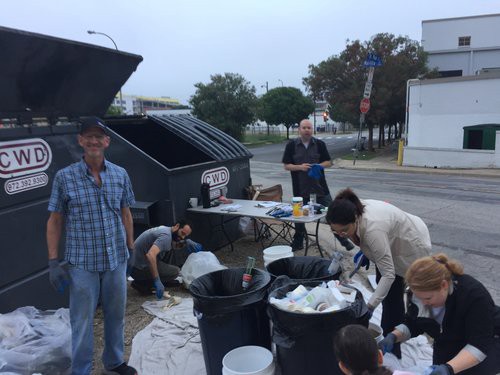
For recruitment of waste audit volunteers, we had to play the game a little differently. Our call out to the community was amplified by the DFW GreenSource publication and on social media. We appealed to those wanting to gain the fundamentals and hands-on experience with waste audits.
Respondents had to sign an accident waiver and detail which days they were available to help. Whether it was just one waste audit or several over several days, every set of hands we could get was appreciated.
Study Samples and Methodologies
Landfill Trash — Each landfill trash bag was carefully sifted to identify and separate recyclable materials, such as cardboard, mixed paper, metals, rigid plastics, and glass from landfill trash items. Each recyclable was placed with like items in containers. For accuracy, full containers of landfill trash and sorted recyclables were individually placed on a tared scale and weighed. Each measurement was recorded manually on a printed spreadsheet labeled with each recycling category listed above.
Usually, the recyclable materials recovered from the landfill trash samples were too contaminated to be recycled, so they had to be returned to the landfill trash dumpster.
Recycling — ZWS had a goal of not only sorting and weighing the recyclable materials collected, but also identifying any contaminants in the recycling stream that could lower the value of those recyclable commodities. The materials pulled from the recycling dumpster were sorted and weighed and any contaminants were pulled, weighed, cataloged, and placed with the previously measured landfill trash debris.
Organics — For businesses that had a food permit, all organic materials (food waste, floral decor, etc.) were weighed separately from the recyclable and landfill trash materials. Only one of the businesses we audited had a composting program. No other food diversion efforts were observed as part of the operations within the other food-permitted businesses, so all food waste was pulled directly from landfill trash bags and, unfortunately, some recycling bags, as well.
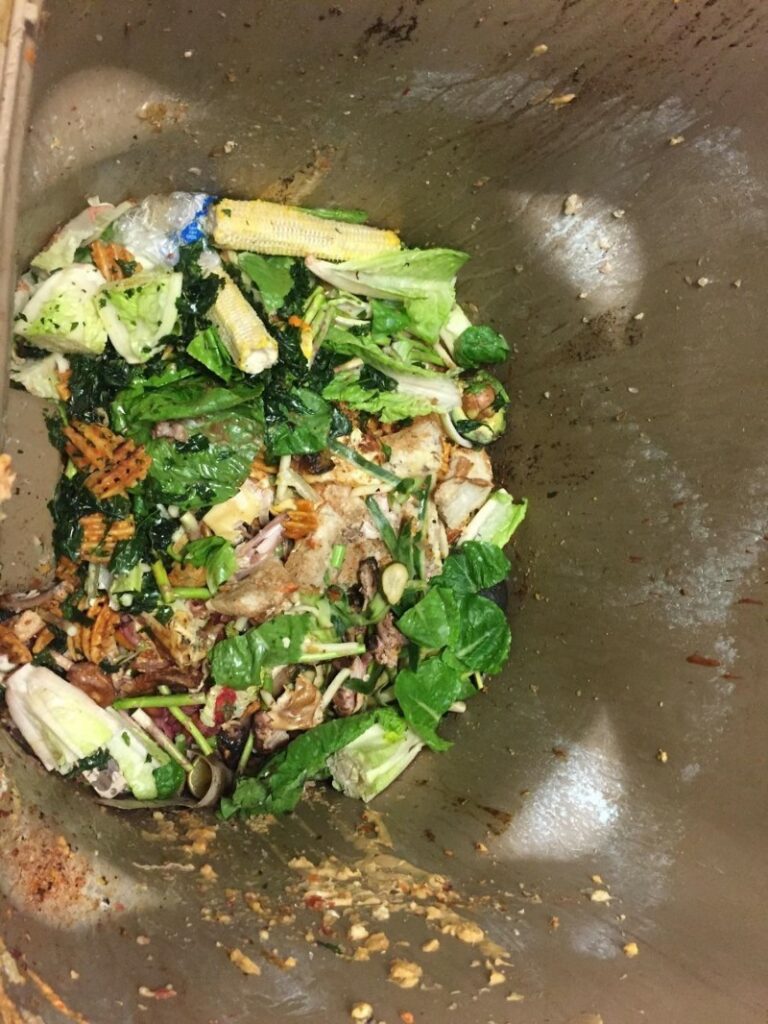
As volunteers showed up each day, the ZWS team would take time to train each volunteer on proper techniques for sorting recyclables and food waste from landfill trash. They were supplied with gloves, goggles, and shoe wraps, among other safety precautions. As materials were being pulled, they had questions about what was recyclable and what was not. We address each concern to ensure they were sorting properly.
As we wrapped up each waste audit at each property, the sorted bags were placed in the proper dumpster and the business property was cleaned to show no trace of activity.
Reporting
After the project was completed, a customized report was developed for each property where observations, graphs highlighting waste totals and percentages, and data conclusions were offered. Based on each property’s baseline measurements and diversion numbers, appropriate recommendations for Zero Waste “best practices” were also reported to help the business participants along in either getting a diversion program started or to expand current diversion programs.
These reports were delivered to the Dallas City Council for review and will hopefully be used to justify expansion of the apartment recycling ordinance to include all commercial properties and food businesses.
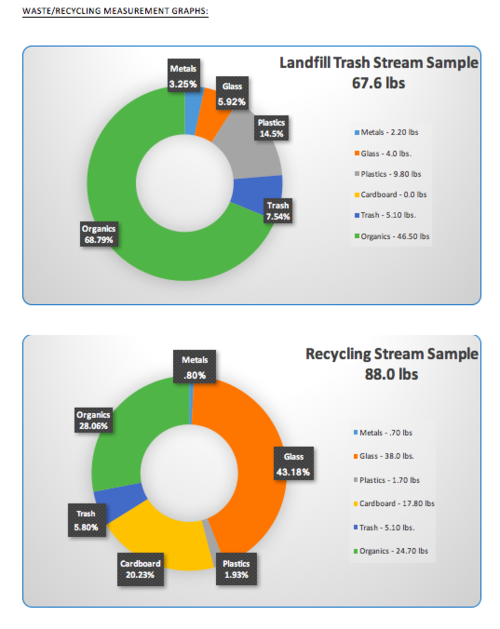
Where are we at? Gathering these baseline measurements are key to businesses determining what waste diversion programs are needed. These are the actual numbers of a small restaurant that is considering a composting program. Do you think these charts will convince them?
A few conclusions
Of all but one of the properties and food businesses the ZWS team studied, we found severe contamination issues in the recycling samples of the businesses that employ this service. There seems to be a large gap in knowledge in how to recycle properly, which points to a major lack in staff & tenant education training. Just like you wouldn’t hand the keys to the cash register to a new employee, you can’t throw a recycling program at those who are supposed to use it and expect them to know how.
Many businesses do not have recycling because they see it as an additional cost of service. What is not being considered is that the waste diversion from the landfill trash allows the opportunity for a “right-sized” program where the landfill trash hauling contract can be renegotiated. To meet their actual service needs, businesses can either reduce the landfill trash dumpster size, the frequency of weekly pickup, or both. Any cost savings realized through a “right-sized” program can be used to offset the costs of new recycling and/or organics diversion programs.
Alternative materials need to be considered in business operations. We have a plastic pollution crisis around the world and businesses can lead the way by switching single-use plastic and polystyrene service wares (to-go cutlery, cups, containers) to reusable materials that can be collected, washed, and reused or even compostable materials. Items such as latex and vinyl gloves can be replaced with compostable gloves and placed in a compost bin after use.
ZWS Services
Zero Waste Strategies offers the following services to help businesses and governments enact waste diversion programs. We offer a complimentary “Green Your Business” Strategy Session to determine if our services fit your specific business needs in attaining your sustainability goals.
- Waste audits to determine baseline measurements
- Review of inventory and purchasing practices
- Provide Service Opportunity Analysis to pinpoint diversion options for reuse and donations
- Hauling contract renegotiations
- Zero Waste training for management and employees
- Building partnerships with other like-minded businesses in the area
- Provide a green marketing edge
Project Facilitators
- Meadows Foundation (grant funders)
- Texas Campaign for the Environment Fund (grant recipient and client of ZWS)
- Zero Waste Strategies, LLC (service contractor for waste studies)
For more information, visit Zero Waste Strategies
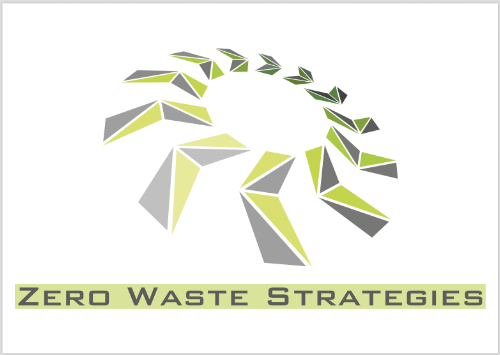
Header Image Caption & Credit: Hop in a dumpster? No problem! Our awesome volunteer saves this hotel chain’s recyclables from latex glove contamination! Image courtesy of Zero Waste Strategies

